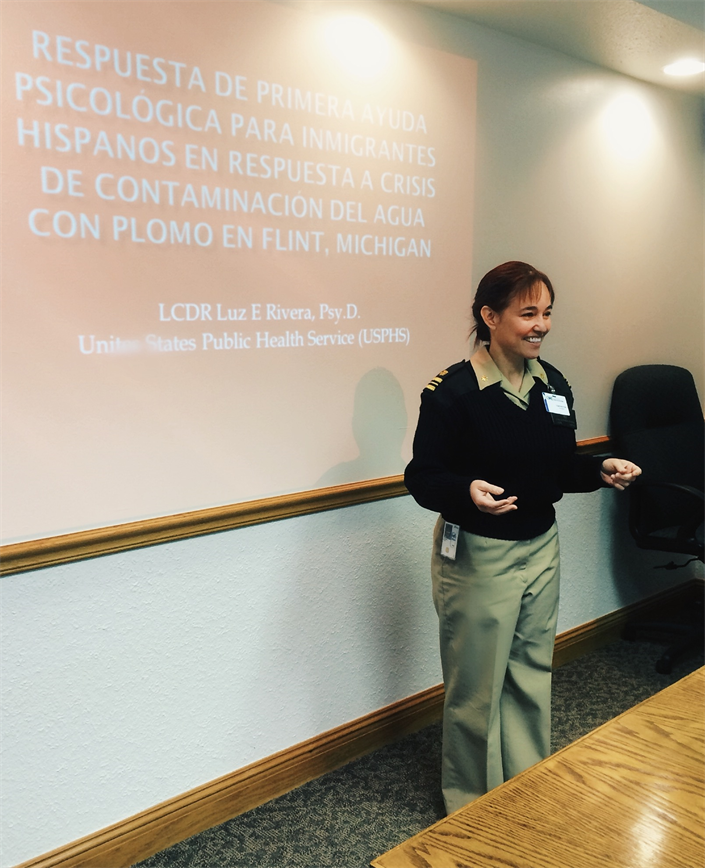Deployment to Flint, Michigan for the Lead Contamination Water Response Mission, 2016
By LCDR Luz Rivera
Quality Assessment Lead
Center for Drug Evaluation and Research for New Drug Applications
Clinical Psychologist (amendment to CDER duty station)
Walter Reed National Military Medical Center
What is your current assignment in USPHS?
I am the Quality Assessment Lead for the Center for Drug Evaluation and Research (CDER) for New Drug Applications. My billet is an amendment to CDER duty station to serve as Clinical Psychologist at Walter Reed National Military Medical Center.
What was the mission of this deployment?
I deployed to the Flint, Michigan lead contamination water response mission, February 2-16, 2016, Behavioral Health Task Team.
What was your role during this deployment? What skills (scientific, personal, etc.) did you use during your deployment?
My role was as a Bilingual Mental Health provider working with Spanish speaking community organizations to train community leaders to provide psychological first aid to Spanish-speaking Immigrants. Skills I used were research, training development, education, psychology, resource mobilization, language, cultural sensitivity, project management, and interpreter to Spanish speaking undocumented immigrants during community clinic.
Was this your first deployment?
No, I have deployed since 2012 as a Spanish-speaking Mental Health provider.
What was the most important thing you learned during this deployment? Any tips/tricks to share with fellow scientist officers?
From my training, I brought with me the experience of knowing to ask questions and not assume that knowing the language is synonymous with knowing the culture or being culturally sensitive. Be prepared to teach cultural sensitivity and the cultural challenges of different Hispanic/Latino immigrant groups.
What did you enjoy the most (e.g., favorite memory) about this deployment?
I enjoyed working with community leaders and a young junior high school student that attended the training for Spanish-speaking community leaders on psychological first aid for undocumented immigrants and Spanish-speaking residents living in Flint.
What would you consider to be your major accomplishment stemming from this deployment?
As a Hispanic that has previously served in South America with people of different South American countries (Ecuador, Peru, Chile, Argentina) using those previously-learned skills to communicate with different people and obtain in a timely fashion the information that was needed to provide a deliverable to accomplish the task. That is, being able to deliver a culturally and linguistically-sensitive document with the goal of creating empathy, awareness and the response needed by the immigrant population. It was great to experience how colleagues from the different countries were willing to share information and resources.
What were some of the main challenges that you experienced during this deployment?
There were intergenerational aspects and issues, such as undocumented Hispanic immigrants as the population to be served, and second generation Hispanic descendant volunteers. Volunteers verbalized similar challenges as non-Hispanic in terms of cultural questions when working with the Hispanic immigrant population. This was resolved by getting in contact with Hispanic organizations from the countries of origin of the population we were serving.
How did you prepare for the deployment – personally or work-wise?
Personally, I prepared my son for my deployment - something I do yearly - letting him know my call months, getting paperwork ready in case of emergency, procuring needed provision, and listing contacts in US and Puerto Rico in case he needed anything. At work, I let colleagues know about our USPHS Commissioned Corps mission and deployments to respond to a need. My colleagues are aware of my areas of expertise. At the moment of knowing the possibility of a mission, it is important to get all teams to complete tasks that could be finished prior to the deployment and to have a plan of all pending projects with resources assigned to them.
Were there any classes, trainings that you had completed prior to your deployment that helped you in your current deployment?
I am part of MHT-2, and we received training before the deployment, CLAS Standards Training, and Psychological First Aid.
How was your post deployment/reintegration experience? Was it smooth to transition back to your daily life as experienced prior to deployment?
There was a smooth transition back to daily life. Colleagues at work wanted to hear about the service and our response to the needs.
Do you have any advice or “pearls of wisdom” for fellow officers who are being deployed/interested in deploying?
In deployments: be flexible, know the team members and their areas of expertise/ strength of colleagues, as they are your primary resource on the ground. Recognize the right talent or the task. Remember that your deployment team is also ready to support you. You may have deployed with your team, even if some members stayed on their duty stations, but they are ready to respond to your resource and information needs to assist in any way in completing the mission.
Is there anything else you’d like to share regarding your deployment?
When facing a challenge, imagine all possibilities to achieve the task. Be creative, and you will discover great ways to implement and achieve the mission. It is an amazing process that allows you to discover all that you are capable of when faced with a short amount of time to achieve a mission in a population that needs/expects the team to succeed.

LCDR Rivera presenting in Spanish on deployment in Flint, Michigan
Next Deployment Narrative Back to Deployment Narrative homepage